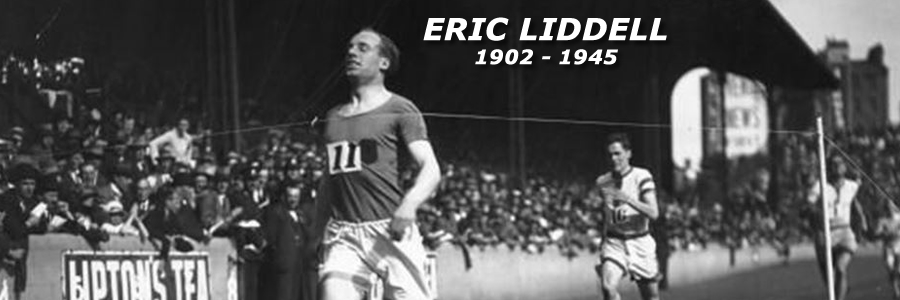The 16th January 2012 marks the 110th anniversary of the birth of one of my great sporting heroes.
Eric Henry Liddell was born this day in 1902 in Tientsin, China.
He was one of the greatest middle-distance sprinters the world has ever seen, a rugby player, who played for his country, Scotland, and above all a man of God.
Born in China to his Scottish Missionary parents, Liddell spent his early years in China and at the age of 6 was send to Eltham College, a boarding school in London with his brother Robert.
Liddell grew up playing Rugby for the school and running at many school track meetings.
In 1920 he joined his brother at the University of Edinburgh to study science.
He played rugby for the University and ran the 100 yards and 220 yards races on the Athletics field.
In 1929 he gained a place in the Scotland National Rugby Squad. He was noted for his speed on the pitch.
Liddell won the AAA (Amateur Athletic Association) Championships for the 100yard race in 1923 in a British Record Time of 9.7sec, an the 220yard race in a time of 21.6sec.
The 1924 Olympic Games were hosted in Paris, France.
Liddell was selected as the UK competitor for the 100yards. However, the heats were to be held on the Sunday. And as a devout Christian; Liddell withdrew and caused consternation within the British Olympic Officials.
Eventually a compromise was reached and Liddell prepared for the 400metre race.
The final was held on the 11th July 1924. Liddell was drawn in the outside lane and couldn’t see his fellow competitors, so he had to run a very fast first 200metres to be clear of the favourites – the Americans.
He was challenged all the way, managing to hold off the field.
He won by a small margin, however, he broke the World and Olympic records, with a time of 47.6seconds. (A record for 12years).
Prior to the race, Liddell was handed a note, that simply said: “In the Old Book it says: ‘He that honours me, I will honour’. Wishing you the best of success, always.”
Liddell’s Olympic training and racing and the religious convictions that influenced him are depicted in the 1981 Oscar winning film – “Chariots of Fire”.
After the 1924 Olympics, Liddell returned to China as a missionary.
For some years, he taught at the Anglo-Chinese College in Xiozhang in Hebei Province. (North East China).
By 1941, Liddell had married Florence McKenzie and had 2 children, (Patricia and Heather) with a third daughter (Maureen) on the way.
Because of the threat from the Japanese (invading China), Florence and the children shipped themselves to Canada. Liddell remained to help his brother Rob, who was a doctor at the local clinic.
In 1943 Liddell was interned at the Weihsien Internment Camp (Weifang). He became a camp leader and organiser, but food, medicine and other supplies were very scarce.
He kept himself busy by helping the elderly, teaching Bible Classes at the camp school, arranging games and teaching science to the children, who called him Uncle Eric.
Because of the conditions in the camp, Liddell suffered very badly and he died on the 21st February 1945. He had an inoperable brain tumour; however, overwork and malnourishment contribute to his poor health.
Liddell was buried in the garden behind the Japanese officers’ quarters, his grave marked with a small wooden cross.
The site was forgotten, until it was rediscovered in 1989, in the grounds of what is now Weifeng Middle School in Shandong Province, North-East China, about a 6-hour drive from Beijing.
In 1991 a Scottish granite headstone was erected on the site by the University of Edinburgh.
The inscription includes the words from the book of Isaiah 40:31
“They shall mount up with wings as eagles; they shall run and not be weary”.

